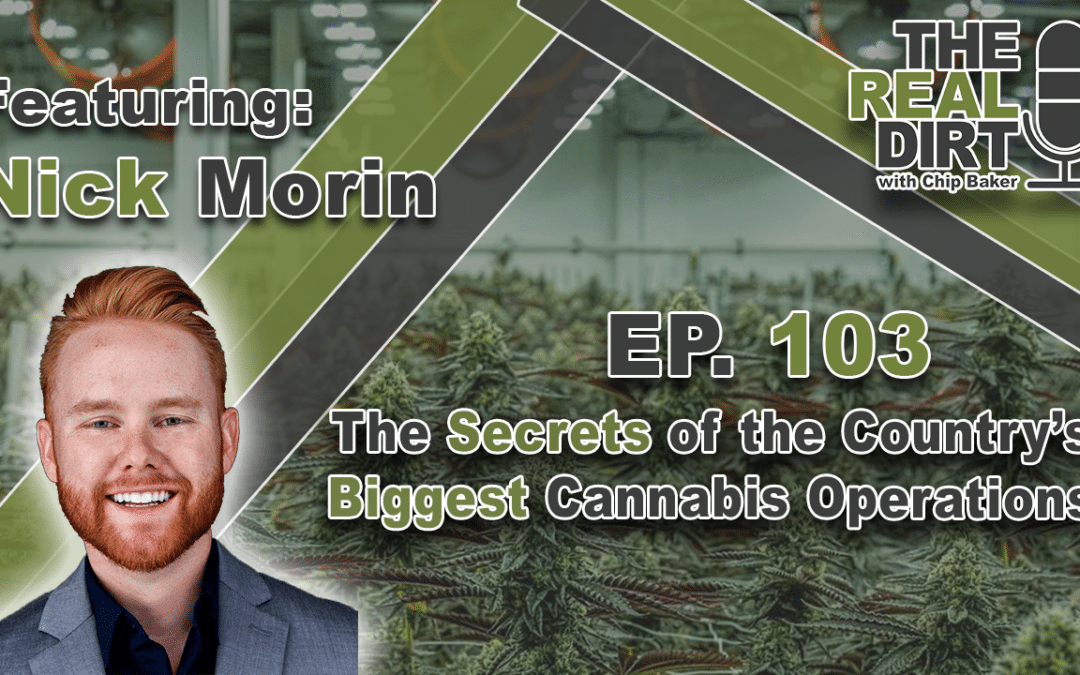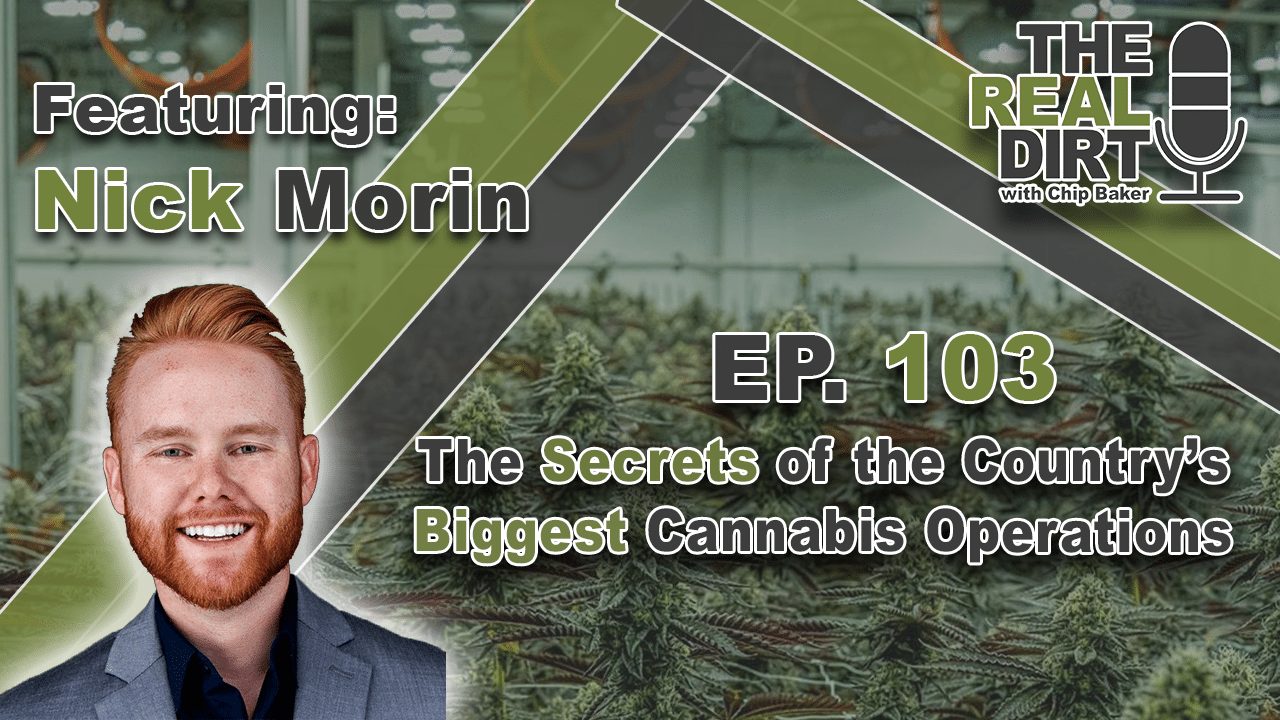Chip: Once again you have reached “The Real Dirt.” And on today’s dirt, it’s a very special episode. Today, I’ve got Nick Morin from Canna Cribs. Now, if you haven’t seen Canna Cribs, you’ve got to check it out, great YouTube channel. It’s absolutely one of my favorites, it’s one of the best production in our whole industry. And if you haven’t seen Canna Cribs yet, you’re missing out. Thank you so much Nick for joining me.
Nick: Chip, thanks for having me. I really appreciate your time.
Chip: Nick called me up a couple, a month or two ago, and said he was going to start a podcast. And we’ve exchanged a bunch of information and talked back and forth and you know, I’m really excited to hear about your podcast. You’ve just launched a new podcast and you know, we just immediately got along on the phone. ‘Cause like, we do the same thing. You know in some manner, is we get to go talk to ganja people all over the country and world and find out, you know, what they’re all about. And get to go into gardens that we may, people just dream about. What’s it like having this dream job, Nick?
Nick: I just would say I’m extremely grateful to be working with my team, you know, my bestfriends and going out and filming these stories, telling these stories now on the podcast. It’s a dream job and it’s something that you know, as a little kid I never would have imagined I’d be here today, but it’s pretty special at this point in time in this industry, as we’re evolving rapidly.
Chip: I know we have a lot talk about. But like, let’s talk about Canna Cribs. How did it start, when did it start, like tell me about it.
Nick: I’ll take you to the exact point in time. CannaCon Seattle, I was talking with my friends that own uh, Glass House Farms in uh, Carpinteria, California. You know, it was dinner, it’s after the trade show. As many people do after a trade show, you go out for dinner and drinks and we’re just brainstorming. And when you get those energies, you know, across the table going and some good ideas, Canna Cribs was born. You know, I wanted to create a Youtube series. And I was really inspired by Marijuana Mania by Berner, and Strain Hunters and their team, and I wanted to come up with uh, kind of my own version of garden tours. I think Growing Exposed was coming up around the same time as well. So you know, I was chatting with, you know, Graham and their whole team over there. And we came up that – it sounds like you got the intro going, so yeah, that’s, that’s it right there, man. So we flew out there shortly after, actually flew to Tucson and picked this up which was a surreal experience in itself right there. I put together my team from University of Arizona, you know, some friends from college, some friends that I’ve worked with, and then some acquaintances kind of one degree away in Tucson. And we flew out there, filmed our pilot and as they say, the rest is history.
Chip: I’ve actually got it on right now, “Glass House Greenhouse Commercial Cannabis Growing Operation in California,” Canna Cribs. I really love this episode, I love everything about it. Like it’s so like, highly produced. I’m a TV junkie, I love format. And like, just the way that you guys have produced this whole series, it like, mimics you know, several other of my favorite type of genres. The like, you know, fix and flip style genre, where they’re either it’s an old junk car they find, the barn find, and turn it into —
Nick: Right.
Chip: You know, something. Something great. Or like, you know, a house, where like they buy it, and they like, fix it and flip it. You’ve got a lot of the like, elements in the editing with that. It really like, draws people in. Man, I also love all of the, the product placement that occurs in this episode and other episodes. It shows the products that people are using, but it’s not like an over the top infomercial advertisement. ‘Cause we all know it’s like, advertising helps pay for it all. It’s very discreetly done, it’s done well.
Nick: Yeah. You’re exactly right. The product placement and advertising, it allows for us to go out there and film. And you know, a lot of people don’t know this, but it’s not like we’re charging farms tens and thousands or you know, a hundred thousand dollars to go out to film. It’s actually no cost, vast majority of the time. So the farm doesn’t pay anything, and we of course have to pay our crew and get out there. And you know, you know this very well, Chip. Youtube gives us zero dollars in advertising. I can’t even spend money on Youtube to promote our show so, it creates an environment where you have to be very scrappy. You have to be wise and extend your dollars through organic content. And the thought leadership behind the brands, the products, the services that these growers are using, it’s a pretty straightforward model where these are the products that their success is built on. Those companies you know like, let’s say soil companies. You know, your background and growing media, and every episode there’s a different growing media. And these growers rely on that product for their success so it’s a really natural fit where we get to educate fans all around the world. We get to help promote the grower through the episode. And then the vendor has an opportunity to promote their products naturally, because we don’t place products that aren’t naturally used at the farm.
Chip: And you can tell the authenticity of it due to that. What was your background in cannabis previous to this?
Nick: So I just say, a lover of the plant. I’m relatively —
Chip: You’re an enthusiast. You’re a cannabis enthusiast. Excellent.
Nick: That’s exactly right. So I started consuming young and you know, I have two older brothers and that probably helped a little bit. Yeah, I actually started Growers Network and Canna Cribs shortly after, during my senior year in college. So, this is my first foray into the, into any professional industry, really. I started a couple communities while I was at the University of Arizona. So I guess I do have a background in kind of grassroots community building from the ground up. And then you know, I have a passion for both cannabis and also technology, and the marriage of the two of those things, as well as marketing and community building, it’s kind of where I live today. And what I’m super passionate about you know, when it comes to sharing very special stories that will impact the history and our future, everyone in this industry with the rest of the world. And just kind of showing and proving that there is a way to have you know, legal, compliant, and really good cannabis at the end of the day that saves lives and builds businesses.
Chip: You came to this as just an enthusiast. You had a surface knowledge of how cannabis operated, how it grew, the production of it all. Did you have some misconceptions that were immediately proven inaccurate when you started doing Canna Cribs?
Nick: I would say that like, everyone on our crew including myself, we didn’t really know, we didn’t really know what went into a commercial sized grow operation. You know, we might have had friends growing here and there, more you know, underground and maybe at the hobbyist or kind of that caregiver scale. But, to walk into a commercial grow operation and see that scale, it was incredible. So I’d say, maybe less misconceptions but more just, you know, kind of what’s behind the curtain. Having the opportunity to share that with the world is really special.
Chip: You talked about the stories, you’ve mentioned that a couple of times. Do you have a favorite cannabis story, or favorite episode that you made?
Nick: Oh my gosh, that’s a tough one. Choosing between your babies —
Chip: Oh I just keep pressing the memo, hey I just started man, I just started.
Nick: I love it. I love it. Yeah, no, I love the question, Chip. So I’d say you know, one of the stories that I probably enjoyed the most telling and also was the most moved by, was Scott Reach of Rare Dankness. He’s gone through a lot of personal turmoil and you can listen to his story with his health, and how cannabis really healed him and gave him an opportunity to you know, run a business and support his family. So, a lot of that comes up in you know, throughout the episode and you know, it’s not every single episode that that story is going to be exactly the same. You know, each episode kind of has a unique, I guess unique story to tell. But with Scott and Rare Dankness, before we went out there you know, we did some research. We always like to do some pre-production research to come up with some story points and kind of build out what the episode’s going to look like before we set foot on set to film. You know, his personal fight with cancer and how cannabis really helped him personally with his fight with cancer, but also his background with breeding and as a geneticist. And through his other companies, he’s building, in my words, he’s building a cannabis empire. It doesn’t stop with just House of Dankness, it doesn’t stop with just Rare Dankness, he has a seed company around the world, he has a new nutrient line. So, one thing that I really resonate with and connect with is the entrepreneurial spirit of these cannabis grow operation owners. And there’s a lot of different types of commercial grow operations, but that episode with Scott, it really shined through, all the different things he had going on, and I loved it.
Chip: He’s really built an incredible room. If anybody’s out there who wants to see great, great, great cultivation grow room, look up that episode. Which episode is it? I’m looking for it now.
Nick: Episode six, it was right after Honeydew Farms in Humboldt.
Chip: Episode six, man, totally. Episode six, Honeydew Farm. The first Canna Cribs was the Honeydew Farms one.
Nick: Oh really?
Chip: And I’ve spent most of my life in Humboldt. I moved there ’97, and still have a property, and farm, and business there today. I heard that there was some, you know, because it’s a small community, so I’d heard that there was some like, thing being filmed, Honeydew Farms. And it was out, so yeah I went and checked it out. That was my first exposure to you. And then of course, I watched all the rest of the episodes.
Nick: Yeah. Yeah, it’s bingeful content. You know, it takes you about a weekend to watch all the Canna Cribs and Deep Roots, and we have a couple you know, new projects on the horizon. But, you know, if you ask me the favorite episode to film as far as where I was, it’s hands down, Alex Moore’s Honeydew Farms in Humboldt. It was my first time travelling there. And I mean, honestly Chip, I felt like the time froze. You know, our cellphones weren’t working. You know, we just had our cameras and we were kind of like, paused in this beautiful forest and his property is pretty amazing as well, you know, on a river basin. It was, it was magical. And we stayed in Arcadia?
Chip: Arcata.
Nick: Arcata, Arcata. So we stayed in Arcata and you know – or no sorry, I apologize. We stayed in Eureka.
Chip: Eureka.
Nick: Yeah, we drove up about an hour and a half up the hill and then an hour and a half back down to our hotel each day. So, we had to wake up super early and we went to bed pretty late each night, because we were battling sunlight. You know, most the farm’s outdoors so we had to film very efficiently with the daylight there. So, part of that was probably some lack of sleep that added to the effect. But, it was amazing. We went out to the waterside as well at the end of the episode. We went to the Redwoods. Everywhere we go, Chip, we try to characterize the region. We try to give the audience a glimpse into what it’s really like. Not just in the farm, but the surrounding area. Because we have around 150 countries around the world watching our Youtube channel, right? So, if someone’s in let’s say, Russia, and they’ve never been to Humboldt, I kind of put it on our shoulders like as a responsibility, to tell them what it’s really like, and to show them that glimpse of the world. And Humboldt is such a beautiful place, and I, I’m actually going to be, right after this interview, I’m actually interviewing two brothers that cofounded Lit House Farms in Humboldt, Big Al and Chris. And then last week, I interviewed Nat at Humboldt Seed Company for the Canna Cribs podcast. So, I love Humboldt —
Chip: Yeah, I know Nat. I’m actually like, growing his seeds right now, Auto OGs.
Nick: Oh nice. Okay.
Chip: Totally, totally. Yeah we got like ten thousand Auto OGs we’ve planted in the past like, two weeks.
Nick: Wow.
Chip: They’ll come out some time in October.
Nick: Well, I’m always finding a reason you know, trying to find a reason to go back so if you still have property, if you have friends up in Humboldt, I’d love to film them some time.
Chip: Ah man. I love it out there. We’ve got so much stuff going on up there, you know. It’s an incredible, geographical environment, you know. It’s a really rough political environment, you know. There’s just a lot of people that do not support legal cannabis and try to stand in your way at every point. It’s really unfortunate because there’s so many small farmers over there that can really bring and grow the best cannabis in the world. They’ve got like, the experience and the time, and the understanding, and the desire, and the heart to do it. But you know the, so many you know, at so many levels, the county and the bureaucracy, and the county is against what they’re doing. How many people in the county, they totally accept it. Right, many of the board of supervisors totally accept it. But, it’s just a fight you know, for anybody trying to get a legal cannabis operation there. And absolutely anybody who has gone through the worst to get one because, it’s not at all, easy there. It’s not at all easy there. So yeah, let’s hope that the industry survives. But yeah, I’ve got tons of connections up there. I’d totally hook you up with anybody you want to, if you can’t figure out who to talk to. You know, I started a potting soil company up there years ago, Royal Gold Soils. I sold soil to everybody up there for years. And currently, my new soil company, Grower Soil, I’m not in California yet. I’m mostly just focusing on you know, the midwest and the east coast. Yeah, I’ve got tons of connections all over man. If you ever want to go see anybody, just ask. I might know them.
Nick: Thank you. And that’s what I love about this industry when I first started out you know, I was working with my bestfriend and roommate at the time, and current business partner, Nate Lipton of Growers House. And he had a spreadsheet of growers, right, that are commercial growers that buy from Growers House. And I was originally, and I still run Growers Network today, all the work you know, a lot of the conversations around Canna Cribs up to this point. But the first company, and it is the production company of Canna Cribs, it’s called Growers Network. And it’s an online forum. We have about 11,000 members all over the world. And just people where they can go, and connect, and learn from each other. And I was just originally handed a spreadsheet of the top contacts from Growers House, and I just interviewed for ten months. You know, I picked up the phone, and the Lean Canvas methodology in the startup world, it’s called Customer Segment Testing.
Chip: Sure.
Nick: So, I just picked up the phone and called the you know, a hundred growers and listened to their paying points and you know, how they learned how to grow cannabis, where they were at in their career you know, super seasoned or new, what hurdles they were jumping over to become a legal professional grow operation. And at no point did I say, “Oh, join Growers Network,” or, “Oh,” like, Canna Cribs didn’t start at that point. So in the very beginning, my first ten months in this industry was just network building and acceptance amongst growers that were complete strangers. And what you just shared with me right now has been my experience up to this point, just generosity and open arms and
welcoming into the industry. So thank you, and thank everyone out there that helps to you know, nurture this industry.
Chip: You know, it’s interesting you say that. ‘Cause there’s really two sides to the cannabis coin. And well, you know, it depends on which coin you’re talking about. But the knowledge coin that we’re talking about, there’s two sides of it. There are the guarded people that won’t let you in, and are closed off, they don’t really want to talk about it so much. A lot of it’s leftover from prohibitionary you know, thinking. Some of it is you know, the propriety knowledge, they think what they have is like, the best. There’s often ego associated with all of that, but that’s one portion of the community. And then the whole other portion of the community, like 75% open. Talks about it, invites you over, wants to know what you’re doing, ‘cause they want to know if they’re doing it right or wrong, right? Are absolutely like, enthusiastic about what they’re growing and want to make it better. So it’s real interesting, it’s not an even coin flip that most people in the cannabis industry that I come across, and I’m a, you know, both us are kind of a unique pawn in the pyramid, but you know, but they openly want to tell us what we’re doing. And tell other people, and talk to other people openly.
Nick: Yeah.
Chip: It’s just a great place to learn, that’s for sure.
Nick: Yeah and right now, you know, I like that you said it’s a great place to learn. Right now, trade shows up to this point were kind of like, the in-person exchange of like, information, and knowledge, and contacts and products, and services. And now that they’re all shut down, what I’ve seen is a huge influx of traffic to our Youtube channel. And to our, you know, Growers Network Grower Forum because people can’t meet in person anymore. So I mean obviously, no one planned for this. But for the content creators out there such as yourself and you know, my team, we’re really in a pivotal point right now where, and that’s why I started this podcast is, we need to kind of ramp up, you know. We need to, you know, create more content and share more stories because there’s not a whole lot of in-person outlets right now. We’re kind of leading that charge and I kind of take it upon us to provide, and kind of have that responsibility to provide that knowledge and information exchange.
Chip: You know, cannabis, the way you learn about it and the way people learn about it now is through this open source. It’s through Youtube, it’s through Google, it’s through this open network of people like, bragging, or people just completely enthusiastic about cannabis. You know, it’s so much different than say, let’s take a trade like, photography. Or marketing, right? With marketing, if you’re interested in marketing , you can go online, and you can buy like, you know, two dozen Frank Curran courses, you can buy like, you know any type of how-to Youtube advertisement, or how-to Facebook advertise or how-to content. But the cannabis industry isn’t like that. Can you shed some light on why you think that is?
Nick: Well, I think you said it a little bit earlier Chip. You know, a lot of people, I’ve heard it on your show as well, there’s a lot of growers out there that in their mindset, and in their belief, they’re growing the best way, right? There are so many processes that go into
growing cannabis. I’m not a grower myself, you know, but in filming these large scale grow operations and then telling these stories, I’ve learned a whole lot about you know, growing cannabis organically. Growing cannabis you know, kind of boutique indoor. Growing cannabis outdoors, you know. 36,000 plants at Los Sueños Farms. So, what I have found is it’s extremely fragmenting on how to grow cannabis. There are so many unique ways and the beautiful part to me, is there’s not one right way, you know? Like, you can grow soil, you can grow soilless. You can grow you know, indoor with LEDs, or indoor with HPS. And there’s all these, right path, left path that you can take throughout the entire grow cycle. And I want to educate the world on all those different options. And in each scene in Canna Cribs, if someone’s listening to this and have not seen a Canna Cribs episode, we always start with genetics. We go through propagation, and we follow lifecycle of the plant all the way through kind of seed to sale, if you will. So throughout each scene, you know, I have not filmed an episode that has completely replicated a previous episode. You know, everyone’s doing propagation a little bit differently. You know, they’re doing veg a little bit differently. So to your question, I think it’s fragmented. You know, email marketing is email marketing, right? There’s some tricks to the trade, but it’s an email at the end of the day. But you know, growing a plant, there are so many different unique ways to do that, and furthermore, there’s always new ideas, right? There’s always someone with an innovative idea and when they share, it’s the rising tide for every grower in the world. And then, kind of you know, fuel to the fire here, new products, right? You are a product inventor. You are a product genius and innovator, and when you, Chip, bring a new product to the market, it opens up a Pandora box of all these new types of cultivation methodologies. So, I think it’s fragmented because there are so many different ways to grow the plant.
Chip: Man, you really hit the nail on the head there. There’s absolutely no one way and that’s just the beauty of ganja, of cannabis, THC or hemp, right? It can grow in a million different spots.
Nick: That’s the resiliency to the plant itself, right? I mean, it’s pure for a reason. I love your saying, plants grow us. You know, we don’t grow plants. And I got to pinch myself right now, ’cause it’s so surreal to actually be on your show, talking to you about that. But, I completely agree. This plant’s here for a reason, it’s extremely resilient. And the fact that it can be grown in all these different, you know, unique ways to the region, to the grower, you know, to the product. It’s here for a reason.
Chip: You started Growers Network 2017, 2018, something like that?
Nick: Yeah, so the end of 2016 going into 2017, I’m a senior at University of Arizona, I did about ten months of research, just trying out what business model to start. You know, I had my hypothesis that I wanted to do something in the community space, get my background, and I thought there was a model there to build a new breed of online growing forums, which is Growers Network today. A little bit more of you know, I pay all my respects of course to the forums that got us here today, like the Grass City and Overgrow and all those amazing forums. But I wanted to do it a little bit differently and provide a safe place for the professional growers that were trying to transcend out of let’s say, a house grow into a you know, 300,000 square foot greenhouse. Like, how do you do that, you know? Who do you talk to, you know, where do you go to learn? Those are the kind of questions that
I was trying to ask these growers and that was what Growers Network was born out of, was that research.
Chip: Man, it has changed since 2016. I mean compared to 2020, right now as we record this episode, it’s August 2020 here in Arizona. I’m in Oklahoma, we have seen cannabis become legal all over the country in the past four years. We have seen, like you know, trends in cannabis happen. We’ve seen governments legalize it, we’ve seen Ponzi schemes associated with it. When you started this, at some point you started to get like, a vision of what was happening. Your perceptions of it in 2016, how did they change from your perceptions of it today, knowing all that change has happened?
Nick: Let’s just start with vendors, for example. Equipment suppliers, manufacturers. So in the beginning days, let’s say 2016. You know I went to my first trade show was a maximum yield show with Nate and his father, my mentor, Pauly. And they’re with you know, Growers House, and we went there to talk to vendors and walk the shows in San Francisco. And, it was all new to me. This professional side of the industry that I just didn’t know existed, you know. You know, as a connoisseur, or a consumer, or advocate in high school and college, I just didn’t know that this whole professional industry existed. You know, I was kind of naive to that. So, since then, I have seen a lot of new products hit the market. I’ve seen consolidation of different companies. Like, take Fluence for example, with you know, OSRAM coming in, and take Hawthorne, for example, and Scotts Group coming in and acquiring Davita. And you know, I listened to that episode on your show, and I loved that one, by the way. And I’ve seen that consolidation happen in a short amount of time you know, past five years on the equipment side alone. On the grower side, you know I’m always trying to pick the next market to go out and film. And I definitely will reach out with you about Oklahoma you know, once it’s a little bit safer to start flying. I definitely want to bring the Canna Cribs crew over to Oklahoma and film some farms out there. But what I’ve seen is, you know, a lot of expansion, you know. It expands into a new region, new state, and then, it kind of restricts down. You know, it’s a period of time where it grows, grows, grows, hits that apex and then, consolidation starts to happen. And kind of that market equilibrium starts to happen, right? The supply and demand starts to balance out. So I’ve seen that happen over the past five years which is pretty incredible. I’ve seen you know, Canada come online and some other parts around the world, Colombia for one, that’s really you know, kind of blowing up and they’re part of the world. So, it’s exciting, and at the same time I’m honored to be able to help document that history.
Chip: Who could have predicted cannabis at Canada would have just skyrocketed and plummeted so quickly?
Nick: Right.
Chip: You know, who could have predicted that Oklahoma, once one of the most conservative places about cannabis in the country would become the best and most premier place you know, to cultivate cannabis in the country? Nobody thought that was going to happen.
Nick: Right. So let me —
Chip: It’s incredible where it’s turning.
Nick: Yeah. Let me ask you this, Chip. So what can we learn, as a country, what can we learn from Canada’s missteps so we don’t follow in the same footsteps?
Chip: Well you know I think we’re already doing the exact same thing. We just weren’t able to have publicly traded companies that could directly trade cannabis on the NASDAQ, right? And any like, insulary type businesses that were allowed to be publicly traded, those were all you know, over the counter, OTC trading stocks. So I think that is really what kept the US investment schema from exploding. But essentially, we still have the same exact elements that were going on in Canada, that are going on here, going on here today. Which are just like, some incredibly savvy people that know how to manipulate the market. That know how to manipulate venture capital groups or family offices. And you know, for instance, the typical cannabis “investment.” There’s two types. There’s one, it’s just like, me, you, and my brother all get together and we decide we want to do a cannabis operation so we throw in our money and make it.
Nick: Kind of the friends thing —
Chip: Friends and family thing. The bootstrap. And man, sometimes like, you come up with millions of dollars that way to start your operation, people call you corporate cannabis. But it’s not, it’s just you, me, and your brother putting it together. And then there’s the venture capital model or the investor model, we’ll call it. And it stems on you know, somebody like you who wants to put in a cannabis operation. Or somebody like me, who wants to put in a cannabis operation. And we develop a business plan, we develop a proforma that’s you know, fictional that we decide, “Yeah we think it should be this way. And we’re going to make this much money over this period of time.” We develop an operational cost, and schedule you know, points of time where we make profit, and investors can get paid back. And people can paint incredibly accurate pictures like that, but then they also create these you know, inaccurate portrayal of what’s happened. And that’s what went on in Canada. Right, it was an inaccurate portrayal of how big the market was.
Nick: Right.
Chip: And so many people went into the marketplace and estimated it to be like, ten times bigger than it actually was and just drove that whole investment strategy. Right, so like that happens here in the US, but it usually happens in two different ways. It happens from the person that’s actually trying to like, get financed or get investors. And they over-exaggerate but you know, knowingly over promise, you know, they don’t either know they can do it or they’re being promised by other people who don’t fulfill their promises. Or you know, however that pans out. And so then, it collapses, right? And then the other way it collapses is when a venture capital group comes in and they you know, the way that venture capital groups work or many of them work, is their funds and they’re someone who like, who’s running the fund and they’re getting paid a percent of the fund that’s spent annually. And they’re constantly going out, like, searching for more capital. And they’ll do stuff like this, so like go` to you Nick like, “Hey Nick, are you interested in cannabis?” Just say yes, just, you know, say yes.
Nick: Yes.
Chip: “Okay, yes you’re interested in cannabis! And you’ve got ten million dollars that you want to invest in cannabis this year?” Just say yes.
Nick: Yes.
Chip: “Well, I’m not going to get you to sign any [inaudible] right now. But, we’ve got all these cannabis operations that come to us. We’ve built a hundred million dollar fund, and if you want to contribute to it then you know, then you can contribute to it. Just deal by deal, you know, basis. You interested in that, Nick?”
Nick: Sounds good to me.
Chip: “Sounds great.” Okay so now, they go to the next guy and they say the same thing and they’re like, “Oh hey man, we’ve already got ten million dollars,” right? You know, “don’t be left behind.” And they hustle all of these people for the investment. Which you shouldn’t say hustle, because everybody’s willing to participate, ‘cause you love cannabis, you’ve got a lot of money and you want to invest in it, right? Like, nothing wrong with that at all. But, the person managing the fund is where it comes into play. ‘Cause now, they’re pressured to spend your money, because that’s how they get paid, right? They only get paid from your investment, is if they find an investment for you and you’ll go through ten before you say yes on one.
Nick: They’re pressured to –
Chip: And then they invest your money, yup.
Nick: And that kind of, it hurts the companies that might be overfunded because then that ties to unrealistic expectations that they have to deliver upon. And that could lead to the demise of their company, and also, the fund. But at the end of the day, the managing partner of said funds has already you know, received their —
Chip: They’ve already been paid.
Nick: Yeah.
Chip: They’ve already been paid. And you know –
Nick: Seems like a flawed model.
Chip: It’s a totally flawed model, but the reality is that you’re so rich, Nick, that you’ve got these ten million dollars that you need to like invest annually. So like, it’s you know, the Canna Cribs is a multi-billion dollar operation now, and you have to lose these ten million dollars every year, right? It’s an oversimplification of how it’s going down. But like, you spend the money and then you move on to the next project, right? And you are, you’re DC manager moves on to the next project, ’cause they got another bunch of people like yourself that got ten million dollars that they want to invest, or have an annual amount every year that they need to invest. So they keep up their legion, and man, that just pumps a bunch of like, a bunch of crap out there, you know. Projects that should be a million dollars turn out to be twelve million dollars. Greenhouses that should be three, four million dollars turn out to be ten million dollars. Indoor rooms that are two million are ten million. And they overspent and I know several of these people that have gotten caught up in this, and they’re my friends. And like, they thought they were doing the right thing ’cause it’s, you know what sounds great? It’s when you say something like this, “We’re building the most highly technical, advanced environmental control system in the whole cannabis industry. I’m going to be able to control my environment and the microcosm. I can control every square inch and I’ve got the data that’s going to be able to back it up.” And you know, that sounds great, right? Well, you know, it’s also like, cost you like millions and millions of dollars to do it. And you may end up you know, growing slightly better or more weed over it but the ROI, I’m spending twelve million dollars on a greenhouse that should cost a million dollars. It’s just you know, it’s not there. It’s not going to be there. And that’s how these things collapse. They’re not built on business, they’re built on investment. And now they’ve got all this operational cost, because it takes two people a hundred thousand dollars a year to run the software that gets all this great data, that they have to pay another whole accounting firm to read it, right?
Nick: Right.
Chip: Right, well.
Nick: You have, having gone through all these examples with your friends and people you know, what you know, cautionary advice could you give?
Chip: Man, the big pang is don’t really believe this investment business plan. I’ve got an investor like, you know, I’m an investor. Like, don’t think that the old way of doing it, the way that you probably thought that was the best way, the way that’s mostly used is the best way. And now, things have changed. And I believe that the investors want to be involved in cannabis right now, it is an essential business. And the opportunity, the advantage is on our side. And it is, an investment where it’s a good, reasonable return, you know, based on profit margin and standard accounting practices. Like that’s a, you know, that’s a good investment.
Nick: Right.
Chip: Right? Like some of the investments I hear about, like the return rates are just so high. The expectations are just so high, you know. It’s just, they fall apart, you know? And the best advice is to say, “Look if you’re going to have an investor, they should be an investor and you should think about it like you’re borrowing money.”
Nick: Right.
Chip: And otherwise, you have a partner. And if you’re going to get a partner, you need to bring in someone who has something other than just money. If they’re just a capital partner, and then don’t have operational stake in the business, man, there’s just so many details there over who gets paid, who does away, and there’s operational agreements that can
define all that stuff. But as soon as you have a silent partner that has invested all of the capital, like, things often go south, right? The paperwork’s not done appropriately, the investor becomes like, upset that you know, the cannabis isn’t performing appropriately. And you know, they’re hearing all these other ideas and they see Canna Cribs, and got all these ideas on how they should improve their scene. And it just often falls apart, right? So like, beware of your investor, is absolutely the best, the best advice. And man, form some solid partnerships. If you’re interested in growing world class weed, well you know what you’re going to need, is you need a world class extractor team. Because all of the weed that you grow, you’re not going to be able to produce into world class weed. So, go find an extractor that you can partner with. You know, hey, if you’re an extractor and you want to make world class weed, go find a grower and go partner with those people. And instead of bringing like this outside investment, like so much of it can be done with inside the community, and probably with like people that you know. But you know, it just takes, you got to get rid of the ego and solely think about the business. And think about the business that you can build together, as opposed to this get rich quick scheme that often comes through with this investor type platform. And I hope I’m not insulting any investors out there, and I mean, I’m one myself and I have other friends that are investors and I think they’d understand what I’m saying here, is you have to be savvy. You have to be savvy on the investment, and you have to be savvy on —
Nick: On both sides.
Chip: And hey, let’s take that on the other side. Just last week, a friend of mine called me up and he’s like, “Hey man. I’m thinking about putting money into this cannabis operation.” He threw out some rate of return, it seemed like a normal rate of return, you know, like a little bit better than bank money. But I looked it all up for them, and I look at their PLs, their BLs, I look at at the proforma, I looked at the location, you know. I checked them out with their state, and these guys were totally full of shit. And they just built this proforma to fool the unsavvy investor. And hey man, my friend he’s a savvy investor in the tech industry. But he doesn’t know anything about cannabis, right? And you know, we just went and looked at the guy’s like, proposed cost for growing a certain amount you know, a large amount of weed, and realized like, “Oh, he’s only spending 40,000 dollars a year growing weed. Like there’s no way he can grow 4,000 pounds,” you know. So like, also —
Nick: It goes on both sides, right?
Chip: It goes on both sides. Like —
Nick: It’s a booming industry right now, and I think with any booming industry it attracts so many apples. And some of them will be bad apples, right? So being cautious, savvy, and as you said, building a world-class community and network of people that can, you can rely now. Like, your buddy calling you whether it’s an investor investing into a cannabis grow operation or a grower calling you and saying like, “Hey, like, should I, should I take this money?” Um, I think that’s so vital to have people that you trust, you know, not part of the deal. It does not have [inaudible] that can you know, help mentor you.
Chip: Yeah, that’s true. And you know, I actually started a consulting group this year, kind of based on that exact principle. Is that you know, I have so many resources in the cannabis
industry and can easily like know or figure out a problem, someone’s already had it in just a matter of moments.
Nick: Yeah.
Chip: And, and we developed this, this, it’s called Greener Group, Greener Consulting Group. We developed this consulting group and you know, with the thought of like, “Oh we’re going to be able to like, help growers, retractors or owners like you know, solve some of their cultivation problems.” And for we immediately started getting calls for was from investors, from state and local governments. Because they need this information. From banks, they don’t know how to bank with cannabis people but want to, you know.
Nick: Interesting.
Chip: And you know, I actually have the connections to one of the guys. He works for us in one of our lead consultants at Greener Group and that’s exactly what he does. He helps banks integrate into accepting cannabis clients as clients, cannabis growers as clients. So there’s this interaction that can happen now that hasn’t happened in the past where you can ask experts. Where you can you know, talk to people that actually know the cannabis industry. And not just your great accountant who’s going to be leery, ‘cause he doesn’t know the cannabis industry or thinks it’s just a widget, you know. ‘Cause it’s not. It’s completely not a widget. So yeah, here’s my little rant, man. You got me talking today. It was supposed to be an interview for you, man.
Nick: Haha, well here’s the cool thing. I want to invite you onto the Canna Cribs podcast.
Chip: I want to come dude, yeah absolutely. Let’s schedule it up anytime, man. And absolutely, I’m going to promote your podcast. I’m stoked that we can be working within the same field and not have to feel that there’s a competitive nature going on.
Nick: Yeah. I’ve built Growers Network and Canna Cribs on collaboration over competition, right? When it comes to content, whether it’s you know, the Grow and Expose Youtube channel, or you know, your podcast. You know, fans around the world, they can listen to our podcast back to back. They can watch our Youtube videos back to back. So, it’s all about collaboration. And I want to say thank you again for you know, opening up your show for me today to join and share a little bit about what we’re doing. And being part of that, I believe you said 75% of the industry of being welcoming and accepting of newcomers like myself.
Chip: You’re no newcomer now, man. That’s for sure. Hey, Nick, I really want to thank you for joining me today. I really appreciate talking to you about all the stuff you’ve done and it’s been a great conversation. We’ll have to have you back on again.
Nick: Definitely, yeah. Thank you and for everyone on your team, keep working hard. I know it’s a really funky time right now, and it kind of sucks that we can’t go to trade shows and see each other and break bread over dinner afterwards. But, I’m looking forward to those days again and in the meantime, let’s podcast it up and you know, YouTube it up.
Chip: Sounds good man. And if you listened to this episode, enjoyed it, and would like to hear others, please download The Real Dirt at The Real Dirt podcast on iTunes. And absolutely subscribe, subscribe, that’s the only way we get to grow. You know, if you’re paranoid, or if you just want to listen to it on website, you can do that too. You can go to therealdirt.com and just stream it right there. But, uh, love you guys, thanks for listening, I appreciate each and every one of you. I always appreciate your comments on Facebook and Instagram. I feel like my growing network of friends just manages to expand every day. Just know, I’m a real person and you can always reach me. And this has been, The Real Dirt.







![The Shady Politics of the MORE Act Vote and Cannabis Legalization [Opinion]](https://therealdirt.com/wp-content/uploads/2020/09/shadowplay.png)









